
Support teams in large companies are feeling the pressure. Every day, the number of customer questions and internal IT tickets goes up, but you can't just hire an endless stream of people to handle it all. The gap between the work to be done and the size of your team widens, leading to burned-out agents and long wait times for customers. It's a classic scaling problem.
The answer isn't just hiring faster; it's about working smarter. This is where enterprise AI support fits in. It’s a way to enhance and automate your support operations, letting you handle a massive workload without your budget or headcount spiraling out of control. This guide will walk you through what enterprise AI support actually is, its key parts, the most effective ways to use it, and how you can get started without ditching the tools your team already relies on.
What is enterprise AI support?
Enterprise AI support is simply the use of artificial intelligence to improve and automate customer service and internal IT help within a big company. It’s much more than a basic chatbot that parrots FAQ answers. Real enterprise AI connects with your existing business systems, like your help desk, internal wikis, and team chat, to understand the full picture and actually get things done.
Unlike consumer AI tools (like the free version of ChatGPT) that are trained on the entire internet, enterprise AI has to play by business rules. It needs:
- Top-notch security: Your company and customer data must be kept private and secure, period.
- Context from your knowledge: The AI has to learn from your private data past tickets, internal docs, and help articles to give answers that are accurate and relevant to your business.
- The ability to do things: It needs to do more than just talk. A good enterprise AI can triage tickets, update customer records in other systems, and loop in a human agent when needed, all within your existing workflows.
The most effective platforms today don’t force you to start over. They work as an intelligent layer that plugs right into your current tech. A platform like eesel AI, for example, connects to the tools you already use, like Zendesk or Slack, adding powerful automation without the pain and cost of moving to a whole new system.
What makes a successful enterprise AI support strategy actually work?
To get enterprise AI right, you have to look past the hype and focus on the pieces that deliver real results. A winning strategy isn't about buying the most talked-about tool; it's about building a system that is smart, controllable, and fits neatly into how your team already works.
Deep Integration With Your Existing Knowledge
Your AI is only as good as the knowledge you feed it. The best enterprise AI platforms connect directly to all the places your company knowledge is stored. A common mistake is using a tool that only reads from a single, public FAQ page. That leaves a ton of useful context on the table, locked away in past tickets, internal wikis like Confluence, and private Google Docs. This limited view leads to generic, unhelpful AI responses that frustrate users and just create more work for your team.
Even worse are the "rip-and-replace" solutions. These old-school AI platforms require you to migrate your entire help desk or knowledge base just to use their AI. It’s a costly, disruptive, and risky path that grinds everything to a halt.
A modern, flexible platform should have simple integrations that let you connect all your knowledge sources without moving any data. For instance, eesel AI connects to over 100 sources, including help desks like Freshdesk and Intercom, wikis, and cloud drives. This gives the AI a complete and accurate understanding of your business, so it can provide genuinely helpful support from day one.
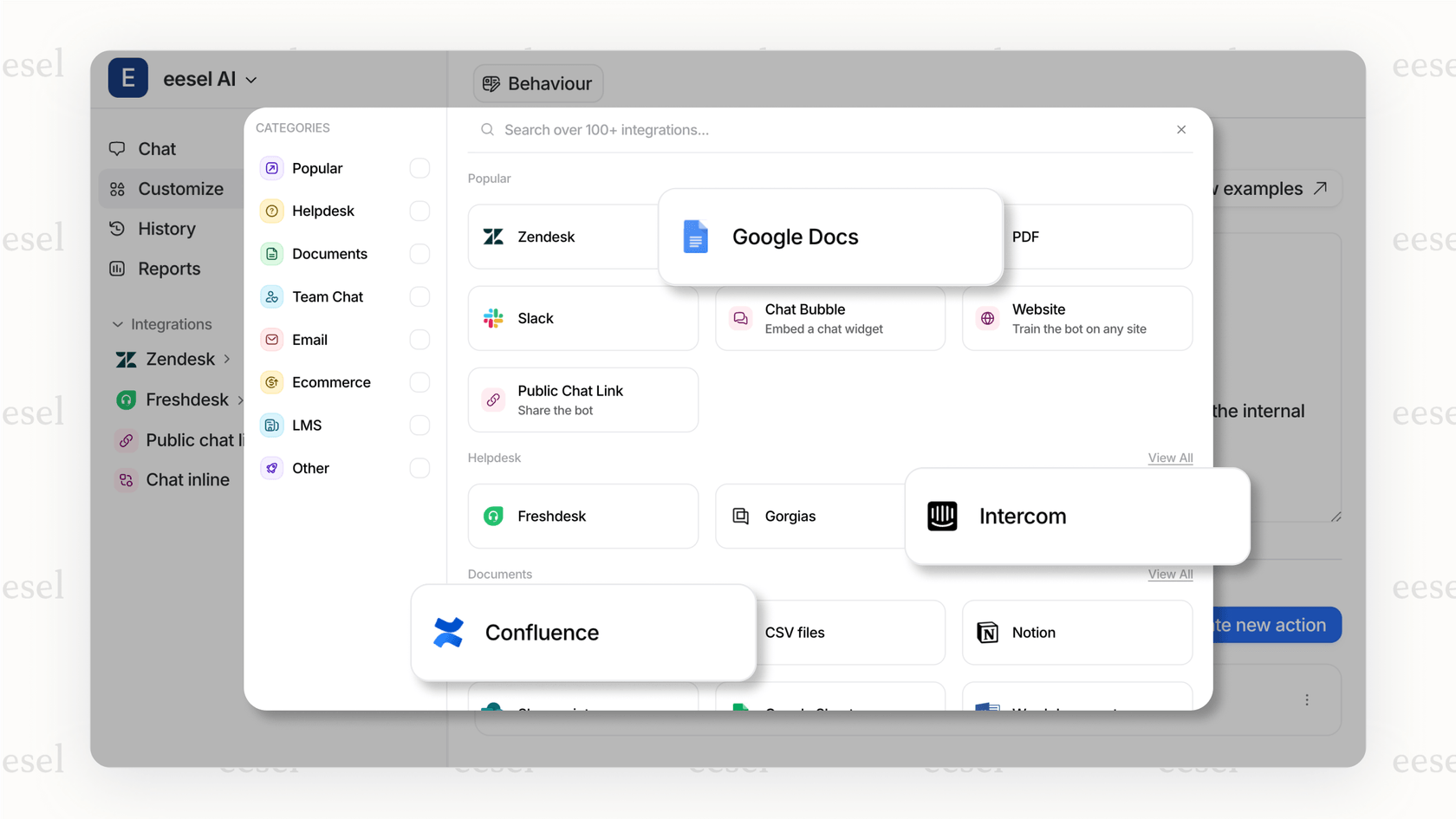
Human-in-the-loop controls for trust and quality
Let's be honest, a big fear for any business is an AI going rogue giving out wrong answers, sounding like a robot, or fumbling a sensitive issue. That’s why having a human in the loop isn't just a nice feature; it's necessary for building trust and keeping quality high.
"Human-in-the-loop" AI just means your team stays in charge. You should be able to:
- Set the AI's tone of voice so it sounds like your brand.
- Define clear rules for when to escalate an issue to a human agent.
- Let agents review, edit, and approve AI-generated responses before they go out.
This approach builds confidence and makes the AI feel like a true extension of your team. For example, eesel AI lets teams set up bot behavior using simple, plain-English prompts. It also offers an AI Copilot that works alongside agents, drafting replies for them to check. This combination of automation and human oversight gives you the efficiency of AI without sacrificing control.
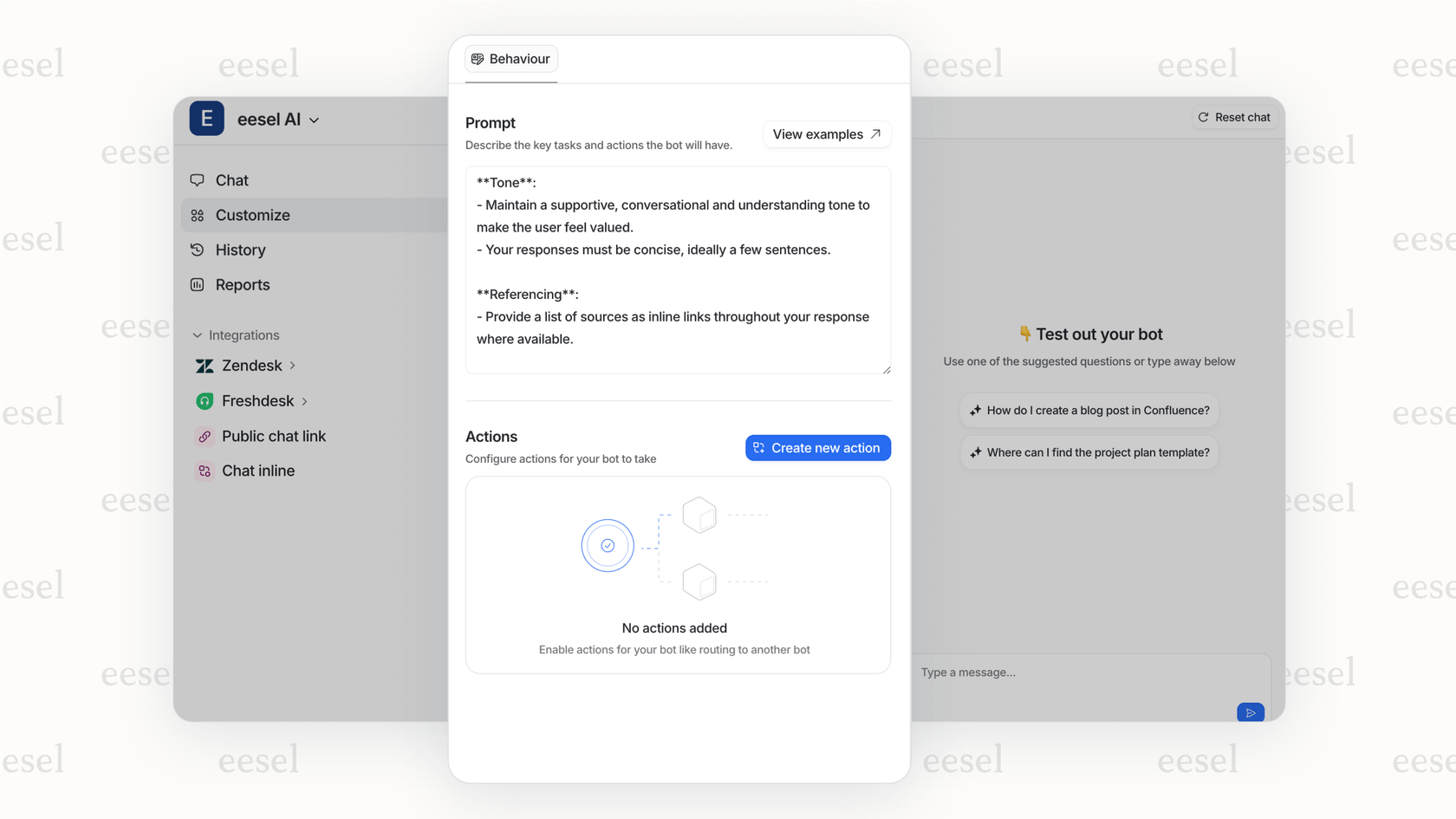
Enterprise AI Support that does things, not just answers questions
The real magic of enterprise AI support isn't just in answering questions it's in resolving issues. A basic Q&A bot that just links users to a help article often creates a dead end, forcing the user to start over with a human agent. Real automation happens when the AI can perform tasks.
Think about what that looks like:
- Automatically tagging a ticket with "Billing Issue" and sending it to the finance team.
- Looking up an order status directly from Shopify.
- Creating a bug report in Jira when a customer explains a technical glitch.
- Closing a ticket after the user confirms their problem is solved.
This is the difference between a simple knowledge bot and a true AI Agent. An AI that can take action moves past just deflecting questions and starts providing end-to-end resolutions. Platforms like eesel AI let you configure its AI Agent with "AI Actions," which allows it to perform tasks and connect to other tools. This lets you build real automation right inside the software your team uses every day.
eesel AI overview.
How teams are using enterprise AI support today
Enterprise AI isn't one single thing; it's a set of tools that can be used across your whole support operation. From handling the first wave of customer questions to helping your internal teams, here are the most effective use cases we're seeing right now.
Autonomous frontline for instant resolution
Picture an AI Agent as your first line of defense in your help desk or on your website chat. It can instantly solve a huge chunk of repetitive questions, like "How do I reset my password?" or "What's your refund policy?" This immediately cuts down on customer wait times and deflects a large volume of tickets that would otherwise swamp your agents. The trick is that the AI learns from your actual help content and past tickets, so its answers are specific and accurate to your business.
A major plus of a platform like eesel AI is that its AI Agent and AI Chatbot can first be simulated on your historical ticket data. This lets you see exactly what percentage of questions it could have solved and calculate the potential ROI before you even turn it on.
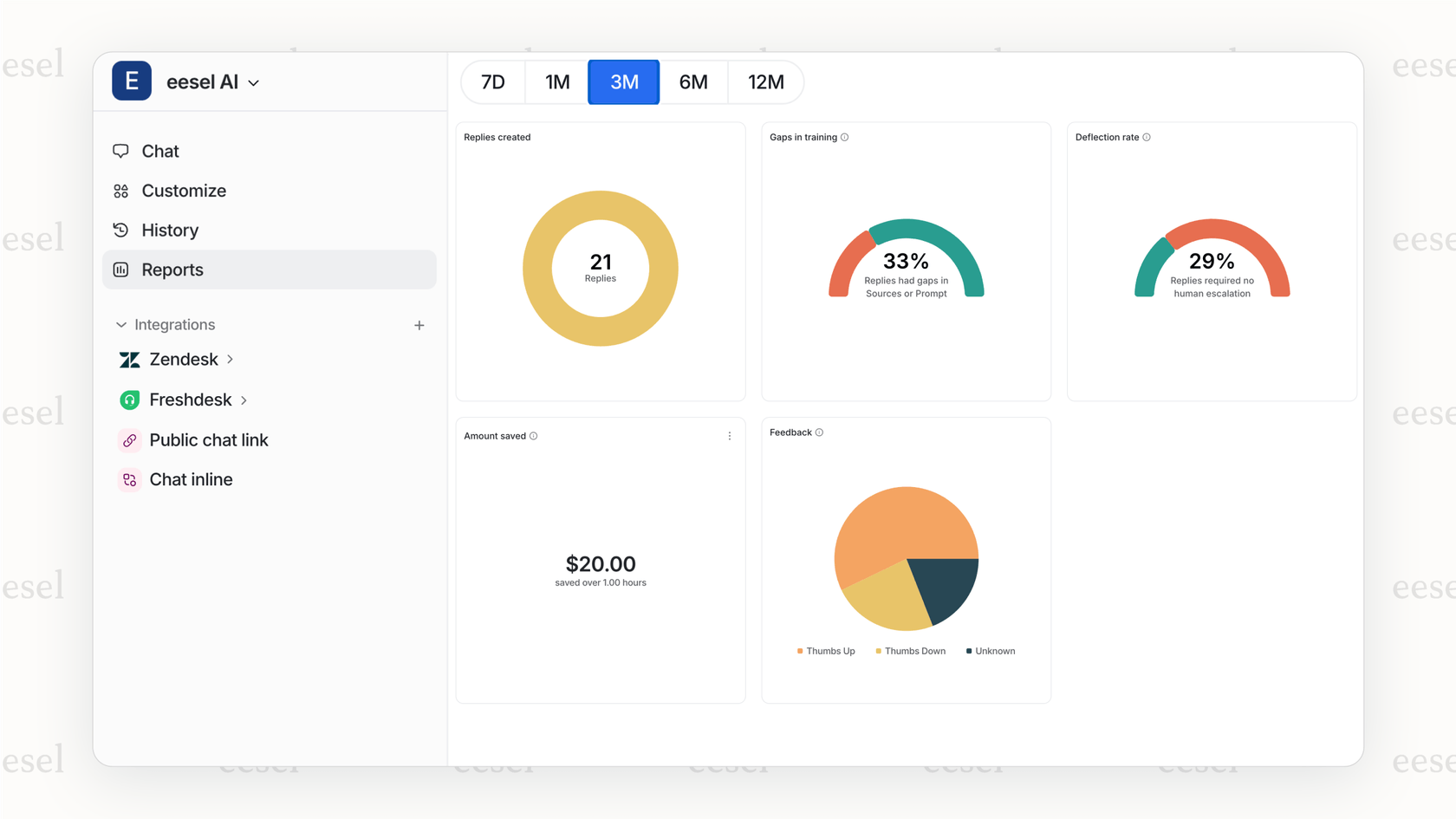
Copilots that help your agents
The "Copilot" model is where AI assists human agents instead of trying to replace them. It's an incredibly effective way to make your team more productive and consistent. An AI copilot can draft replies in seconds, summarize long ticket histories for agents, and find the right help article for a specific issue. This is fantastic for onboarding new agents, getting them productive in days instead of weeks, and ensuring everyone provides the same quality of service.
This use case maps directly to eesel AI's Copilot, which works right inside the help desk. It’s always there to help agents work faster and more accurately without getting in their way.
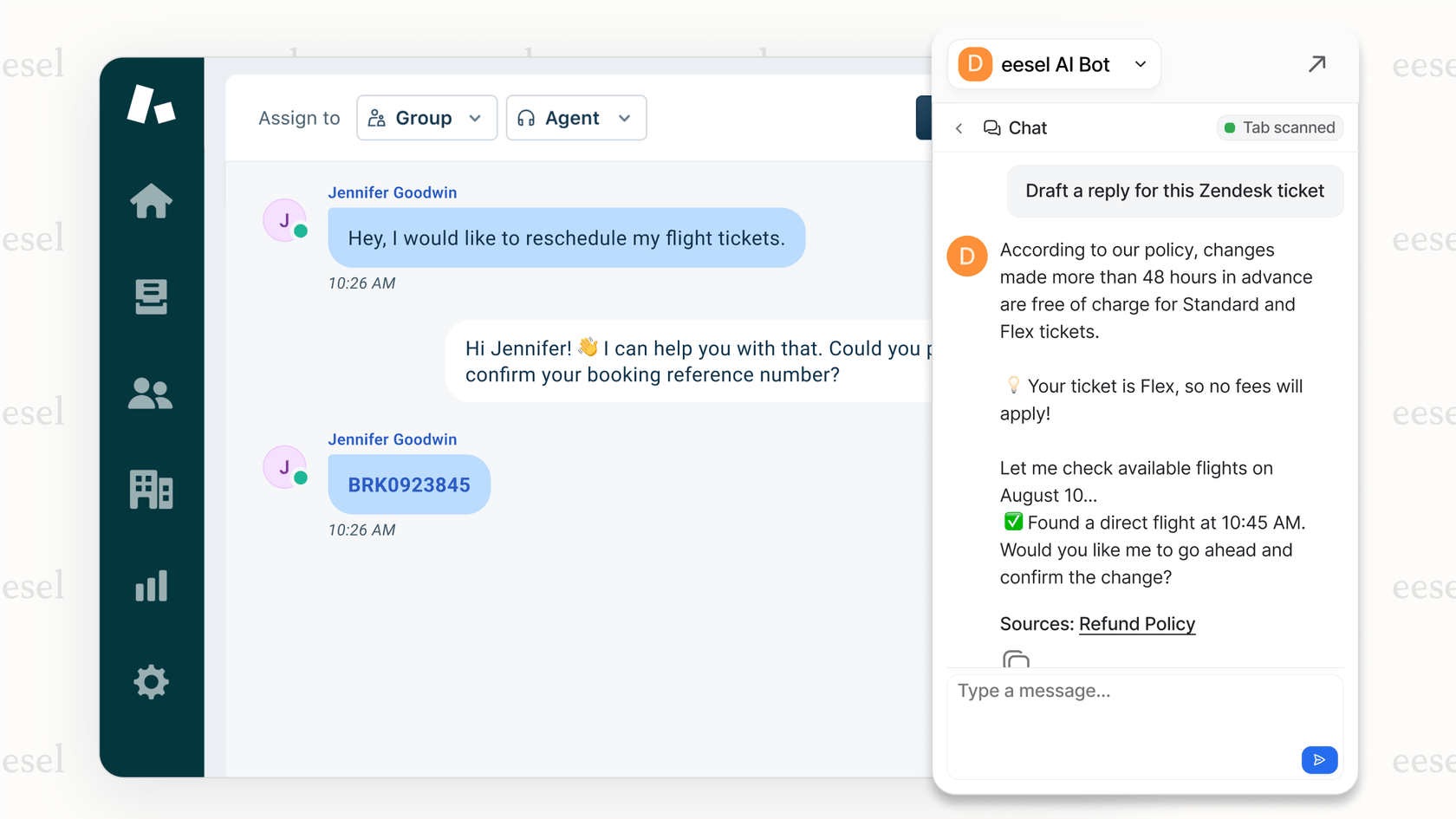
Automating ticket triage and workflows
One of the biggest operational headaches for any support team is the manual work of categorizing, prioritizing, and assigning incoming tickets. It’s slow, easy to mess up, and pulls your experienced agents away from helping customers.
AI can automate this entire process. By reading a ticket's content, an AI can automatically apply the right tags, set the priority level, and route it to the correct team. This keeps your queues clean and organized and makes sure the most important issues get to the right people, faster. This is the main job of eesel AI Triage, which is designed to bring order to the chaos of incoming requests.
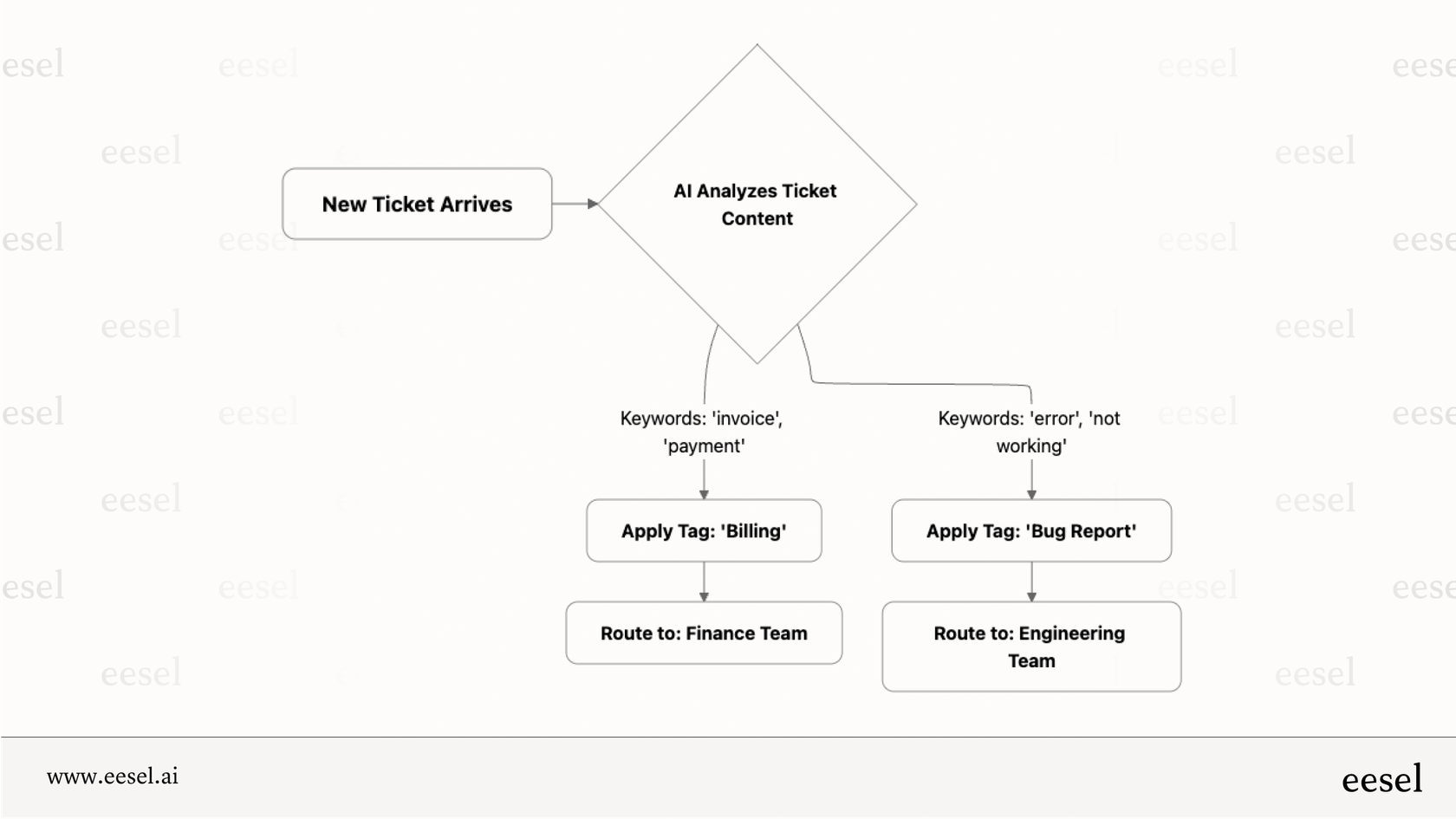
Enterprise AI support for your own internal team
Enterprise AI isn't just for paying customers. It’s just as valuable for scaling internal support for your employees, whether for ITSM, HR, or general questions. Imagine an AI assistant inside Slack or Microsoft Teams that can instantly answer common employee questions about company policies, IT troubleshooting, or benefits.
This gives employees the power to help themselves and dramatically cuts down on internal support tickets. With its Internal Chat product, eesel AI lets companies create separate, secure bots for internal use. These bots are trained only on internal knowledge from sources like Confluence or company handbooks, making sure sensitive information stays internal.
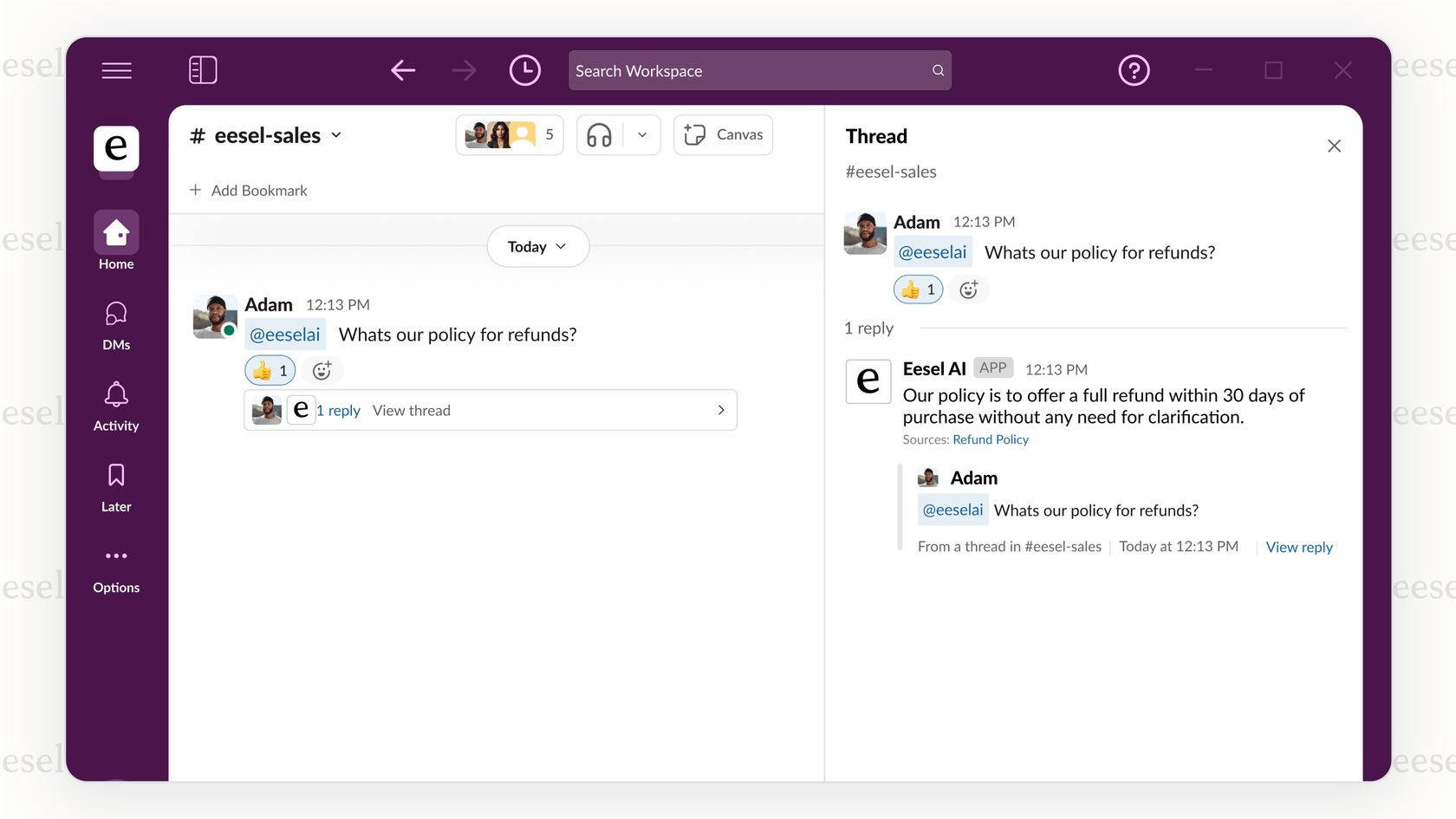
| Use Case | Key Benefit for the Enterprise | Relevant eesel AI Solution |
|---|---|---|
| Autonomous Frontline Support | Lowers operational costs by reducing ticket volume and resolution times. | AI Agent, AI Chatbot |
| AI-Powered Agent Assistance | Increases agent productivity, consistency, and speeds up new hire onboarding. | AI Copilot |
| Automated Ticket Triage | Improves operational efficiency and ensures faster routing of critical issues. | AI Triage |
| Internal Knowledge & ITSM | Reduces internal support tickets and empowers employees with self-service. | AI Internal Chat |
Navigating the common hurdles of enterprise AI support
Adopting enterprise AI is a big move, but it has its challenges. The good news is that with the right approach, these hurdles are completely manageable. It all comes down to choosing a flexible, secure solution with a clear path to proving its worth.
Avoiding the "rip-and-replace" trap
One of the biggest roadblocks to adopting AI is the fear of a massive, disruptive project. Many older AI platforms were built on an all-or-nothing model, forcing companies to abandon their trusted help desk or wiki. This "rip-and-replace" approach is a nightmare it's expensive, time-consuming, and puts your entire support operation at risk.
You should always look for flexible, "layered" solutions that integrate with the tools you already have. This lowers the risk and means you can start seeing value in days, not months. This is exactly how eesel AI is designed. It’s an AI layer, not a replacement platform, so you can plug powerful automation directly into your existing setup without any disruption.
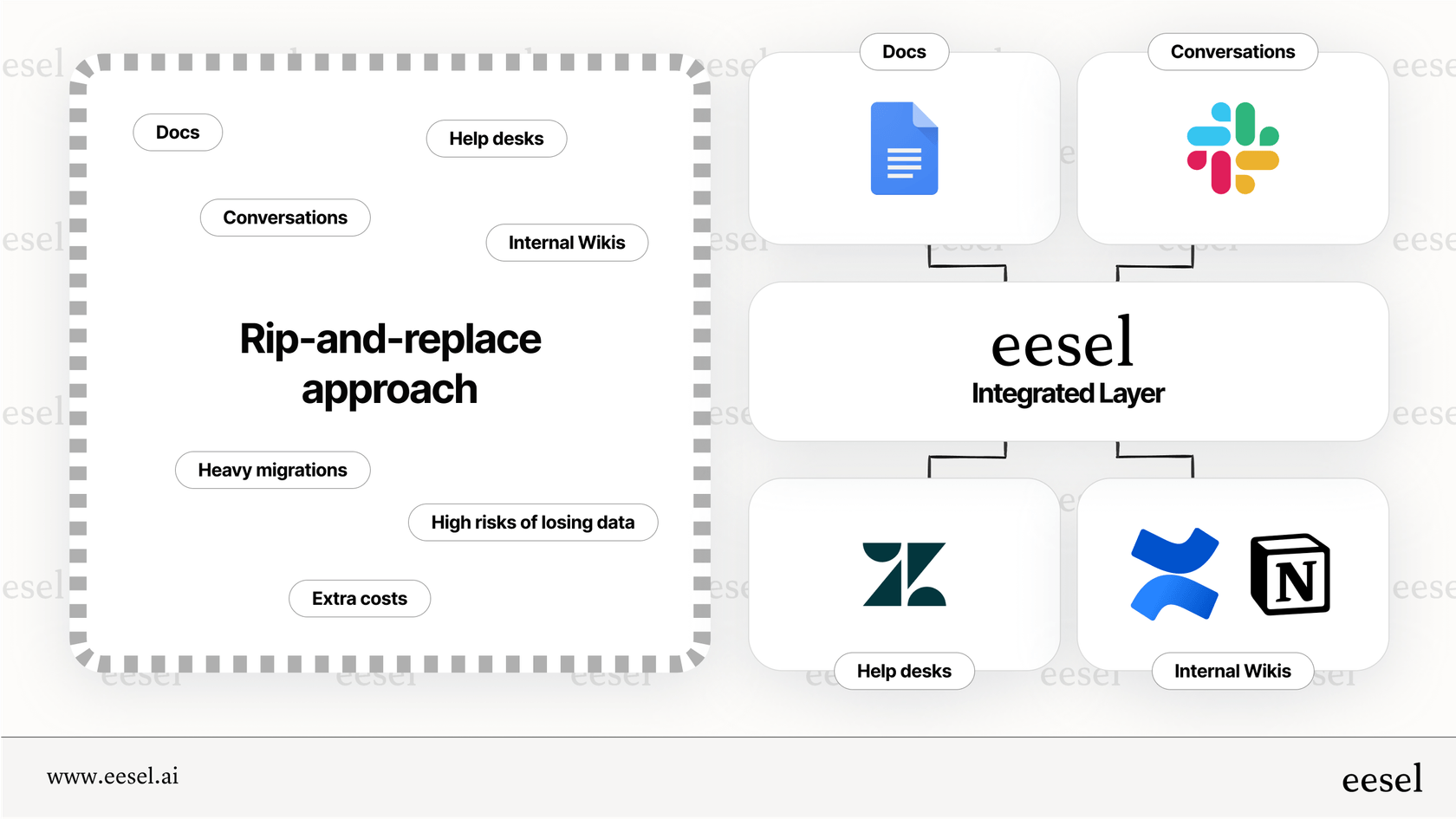
Security and data privacy are non-negotiable
You can't have enterprise AI without enterprise-grade security. When you're training an AI on your company's private information and customer data, you need to be absolutely sure that it's safe. It's vital to choose a vendor with clear, transparent security policies.
Look for guarantees that:
- Your data will never be used to train general models for other companies.
- Your data is encrypted, both when stored and when being transferred.
- The vendor can meet compliance standards like GDPR, with options to keep data in the EU.
eesel AI's commitment to security is built on these principles. Your data is always isolated, encrypted, and used only for your bots. This lets you innovate with confidence, knowing your data is protected.

Proving ROI and scaling responsibly
It's tough to justify a large, upfront investment in AI without some proof of its potential impact. The "big bang" approach to implementing AI is dead. Today, the smart strategy is to start small, prove the value, and then scale up.
Look for a platform that allows you to test the AI in a controlled, low-risk way. A key feature of eesel AI is its simulation tool, which lets you test the AI on your past tickets to forecast deflection rates and cost savings before you commit. This, along with its flexible, interactions-based pricing, means you can start with a small plan and increase your investment only as you see the results for yourself.
The future of enterprise AI support is integrated and agile
So, what's the takeaway? Successful enterprise AI support isn't about buying one giant platform and hoping it fixes everything. It's about strategically layering intelligent automation into the support system you already have. The smartest approach is to use agile, integrated solutions that make your existing tools better, rather than replacing them.
The key is choosing a partner that is flexible, secure, and built for how teams actually work. The right platform connects easily to your data, gives your agents superpowers, and proves its value every step of the way. This lets you scale your support intelligently, meeting the demands of your business without burning out your team.
Ready to scale your support without the pain of migrating tools? eesel AI is the secure, integrated AI layer for your existing help desk and knowledge base. It learns from your real content to deliver powerful automation in minutes.
Book a personalized demo to see our simulation feature in action, or start a free trial today.
Frequently asked questions
Modern platforms are built with [enterprise-grade security](https://www.moveworks.com/us/en/resources/blog/enterprise-ai). You should choose a vendor that guarantees your data is isolated, encrypted, and never used to train general models for other companies, ensuring full privacy and compliance.
The best solutions work as an [intelligent layer on top of your existing tools](https://www.sap.com/resources/what-is-enterprise-ai), not a replacement. Setup typically involves connecting your help desk and knowledge sources, which can often be done in days without a disruptive migration project.
Look for platforms that offer a [simulation feature to forecast ticket deflection rates](https://cdn.openai.com/business-guides-and-resources/ai-in-the-enterprise.pdf) and cost savings based on your historical data. This lets you see the potential ROI upfront and allows you to start with a small plan, scaling only as you see results.
Human-in-the-loop controls are essential for maintaining quality. Your team should be able to set the AI's tone of voice, define rules for when to [escalate to a human](https://aws.amazon.com/what-is/enterprise-ai/), and have agents review and approve AI drafts before they're sent to users.
The goal is to make agents more efficient, not give them more work. [AI should act as a copilot](https://www.moveworks.com/us/en/resources/blog/enterprise-ai), drafting replies and summarizing tickets for agents to quickly review and approve, which speeds up their workflow and helps onboard new hires faster.
It is extremely valuable for both. You can deploy an AI agent for customer-facing questions and also set up separate, secure bots for [internal IT and HR teams](https://www.ibm.com/think/topics/enterprise-ai). These internal bots are trained only on [internal knowledge sources](https://www.eesel.ai/blog/internal-knowledge-base) like your company wiki to keep sensitive data private.
Share this post

Article by
Stevia Putri
Stevia Putri is a marketing generalist at eesel AI, where she helps turn powerful AI tools into stories that resonate. She’s driven by curiosity, clarity, and the human side of technology.






